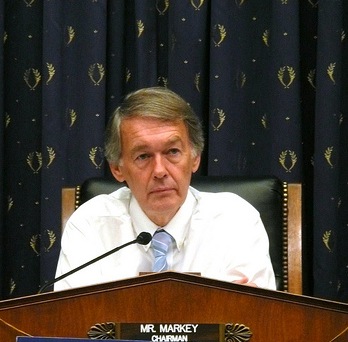Lawmakers Seek to Attach a String to Detroit Bailout
Frustrated by decades of automaker resistance to adopting more strict fuel-efficiency standards for their vehicles, Markey and others want to make the rules part of the rescue package.
Jul 31, 20201.6K Shares267.2K Views
Rep. Edward Markey (D-Mass) (markey.house.gov)
As Congress and the White House negotiate the conditions of $15 billion in short-term financing for the automakers, a growing chorus of lawmakers, economists and consumer advocates is calling for specific fuel-efficiency benchmarks to be written into the legislation.
Rep. Edward Markey (D-Mass.), chairman of the House Select Committee on Energy Independence and Global Warming, said Tuesday that cash alone won’t be enough to rescue an industry with a long history of fighting such reforms as seat belts, airbags and more fuel-efficient vehicles. Instead, Markey said, any bailout should “require a change of culture … that answers challenges with innovation rather than lobbying and litigation.”
Illustration by: Matt Mahurin
“It must destroy forever the industry’s fear of change,” he said during a hearing on how to mesh the bailout with the nation’s plans for energy independence.
Markey’s comments arrive as Congress and the White House continue to haggle over the details of a plan to provide two of Detroit’s Big Three — General Motors and Chrysler — with $15 billion in emergency loans to tide them over until March. Without the cash infusion, the companies say they would go out of business at the end of this month. Ford has said it has enough cash to survive 2009 without government help, though the company has requested a $9-billion line of credit as an emergency backstop if the recession deepens.
Discontented with the lax regulation of the Wall Street bailout, lawmakers on both sides of the aisle have sought more specificity and oversight in the Detroit rescue bill to ensure that the money is spent as Congress intends.
Senate Majority Leader Harry Reid (D-Nev.) said a vote on the bailout plan could come as soon as Wednesday morning, but the Bush administration has yet to approve the Democrats’ latest proposal.
Harming the bill’s chances of passage, Senate Minority Leader Mitch McConnell (R-Ky.) took to the chamber floor Tuesday to announce his opposition to it. The current plan, he said, “fails to achieve our goal of securing the long-term viability of ailing auto companies.” A Senate filibuster could kill the bailout legislation.
A draft of the bill was unveiled yesterday. Among the sticking points is a provision, opposed by the White House, that would force the automakers to drop lawsuits against states seeking to impose emission standards more strict than federal rules. Led by California, more than a dozen states have applied for Environmental Protection Agency waivers to implement the new rules, which would force emission reductions of 30 percent by 2016. The new standards are an indirect way of forcing the automakers to produce higher-mileage cars.
The automakers and their congressional allies have fought vigorously against the waivers, arguing that they would force the car manufacturers to produce two sets of vehicles to cater to two sets of rules.
“Uniformity is the key,” said Rep. Candice Miller (R-Mich.), a staunch defender of the industry.
But others are leaning in another direction entirely. Markey on Tuesday said he’d like to see the bailout legislation go a step further and grant California’s waiver outright.
Public Citizen President Joan Claybrook, in testimony Tuesday before Markey’s committee, said that because the auto industry has historically been reluctant to make voluntary safety and fuel-efficiency reforms, Congress should write the changes it wants into the bailout bill.
“The auto industry has made promises, promises, promises,” said Claybrook, who headed National Highway Traffic Safety Administration from 1977 to 1981. “Anything that we want these manufacturers to do should be in the law.”
Peter Morici, a University of Maryland economist who’s been criticalof Detroit’s automakers, cited another reason to include specific fuel-economy benchmarks in the bailout legislation: The price of gasoline has dropped precipitously in recent months. “If the price of gasoline sinks and stays at a buck and a half a gallon,” Morici said, “then all of a sudden those big pickup trucks start looking good again and [the automakers] can make a lot of money.”
No change has been so resisted by the industry as that of increased fuel-efficiency standards. For decades, the automakers have successfully fought against the efforts of environmentalists and lawmakers (including Markey) to nudge the companies to produce higher-mileage vehicles. Between 1975 and 2007, federal fuel standards didn’t change.
The low fuel-economy rules allowed Detroit to build its business model around production of gas-slurping sports utility vehicles, or SUVs. When the price of a gallon of gas jumped to $4 this summer, consumers stopped buying Detriot’s gas guzzlers, a trend reinforced by the onset of the recession. As a result, the Big Three have been left with dealer lots full of unwanted Hummers and factories that can’t produce anything else. To retool those plants to make smaller, more fuel-efficient cars, Congress passed $25 billion in aid earlier this year. In the meantime, at least two of the companies need another cash infusion just to stay in business.
Last week, Detroit’s Big Three submitted plans to Congress outlining how they would revamp their business models to return to profitability. GM, for example, said it can reach fleet-wide fuel-efficiency levels of 37.3 miles a gallon for cars, and 27.5 mpg for trucks, by 2012.
Ford, meanwhile, claimed it would up its mileage standards 36 percent above 2005 levels by 2015.
Based on those figures, the Natural Resources Defense Council issued a reportthis week indicating that if those goals were met by 2015, both companies would be in compliance with California’s proposed emission standards. That analysis added fuel to Markey’s push to include the benchmarks in the Detroit bailout.
“If they’re testifying to the fact that they can meet that standard,” Markey said, “and they want money from us … doesn’t it make sense to put their promises, technologically, into the law, as the condition of getting the money?”

Hajra Shannon
Reviewer
Latest Articles
Popular Articles

